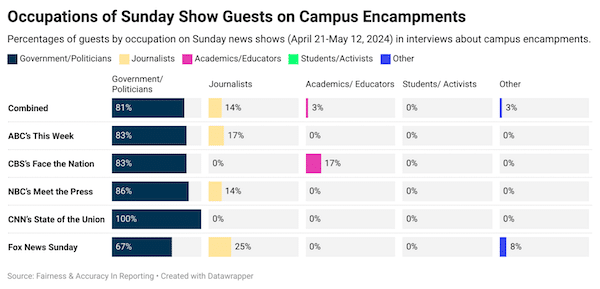Recent student-led campus encampments in solidarity with Palestine prompted considerable media conversation. But, according to a new FAIR study examining TV and newspaper discussions in the period from April 21 to May 12, those conversations rarely included students themselves—and even fewer included student protesters.
FAIR examined how often key corporate media discussion forums contain student and activist voices. The Sunday morning shows (ABC’s This Week, CBS’s Face the Nation, NBC’s Meet the Press, CNN’s State of the Union and Fox News Sunday) brought on no students or activists, opting instead to speak primarily with government officials.
The daily news shows we surveyed—CNN’s Lead With Jake Tapper, MSNBC’s ReidOut, Fox News‘ Hannity and PBS’s NewsHour—were slightly better, with six students out of 79 guests, but only two of them were pro-Palestine protesters.
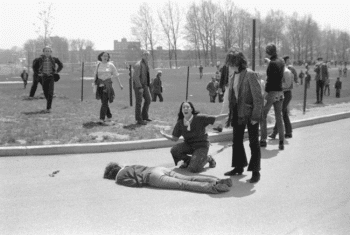
Jeffrey Miller lies on the pavement, one of four students killed when the National Guard was sent in to suppress protests at Kent State on May 4, 1970.
The op-ed pages of the New York Times, Washington Post, USA Today and Wall Street Journal featured two students out of 52 writers, only one of whom was a protester.
Sunday Shows: Student-Free Zone
The agenda-setting Sunday morning shows, which historically skew towards government officials (FAIR.org, 8/12/20, 10/21/23), showed no interest in giving airtime to student or activist voices. For the first weeks following the first encampment set up at Columbia University, when the student protests began to command national media attention, FAIR analyzed every episode of ABC’s This Week, CBS’s Face the Nation, NBC’s Meet the Press, CNN’s State of the Union and Fox News Sunday.
Out of 36 one-on-one and roundtable guests across all networks, 29 (81%) were current or former government officials or politicians, and five (14%) were journalists. One academic and one think tank representative were also featured. Of the 29 government sources, only six spoke about having personal experience with the protests, or about universities in states they represent.
No students or activists, and only one academic, were invited to speak on any of the Sunday shows. The one academic, Robert Pape of the University of Chicago, didn’t speak about his own experience with the encampments, but about his research on student safety.
Some guests utilized inflammatory language when discussing the protesters, who were never afforded the opportunity to defend themselves. On This Week, Republican Sen. Tom Cotton (ABC, 5/5/24), referred to the encampments as “Little Gazas,” and said the students “deserved our contempt” and “mockery.” “I mean, they’re out there in their N95 masks in the open air, with their gluten allergies, demanding that Uber Eats get delivered to them,” he said. Later on, Cotton referred to a keffiyeh—a symbol of Palestinian identity and solidarity—that protesters had put on a statue of George Washington as a “terrorist headdress.”
Three guests were asked about the idea of bringing in the National Guard to quell protests, only one declared it to be a bad idea. The other two gave similarly equivocal answers: Sen. J.D. Vance (Fox News Sunday, 4/28/24) said, “I don’t know if you need to call in the National Guard,” while Republican congressional candidate Tiffany Smiley (Fox News Sunday, 4/28/24) responded, “I don’t know if the National Guard is necessary.” But both agreed that some kind of police response was needed to these student protests.
In most other instances, the host would ask a politician for their thoughts on the encampments, to which the guest would respond with platitudes about nonviolence. For instance, CNN‘s Jake Tapper (5/5/24) asked Biden adviser Mitch Landrieu whether groups like Jewish Voice for Peace are “causing unrest for the American people.” Landrieu responded,
Everybody has a right to protest, but they have to protest peacefully.
Framing the questions
Throughout the Sunday show discussions, there was a heavy focus on whether the protests were violent and antisemitic, and next to no explanation of the demands of the protesters. Even though violence by—as opposed to against—campus protesters was very uncommon, politicians continually framed the protests as a threat to safety. White House national security communications advisor John Kirby (This Week, 4/28/24) decried “the antisemitism language that we’ve heard of late, and… all the hate speech and the threats of violence out there.”
Of all 64 questions asked to guests, only one—CNN’s interview with LA Mayor Karen Bass (4/28/24)—mentioned divestment, the withdrawal of colleges’ investments from companies linked to the Gaza military campaign and/or Israel, which was the central demand of most of the encampments. Moreover, this was the only instance in which divestment was discussed by any host or guest on the Sunday shows. On the other hand, 20 of the 36 conversations named antisemitism as an issue.
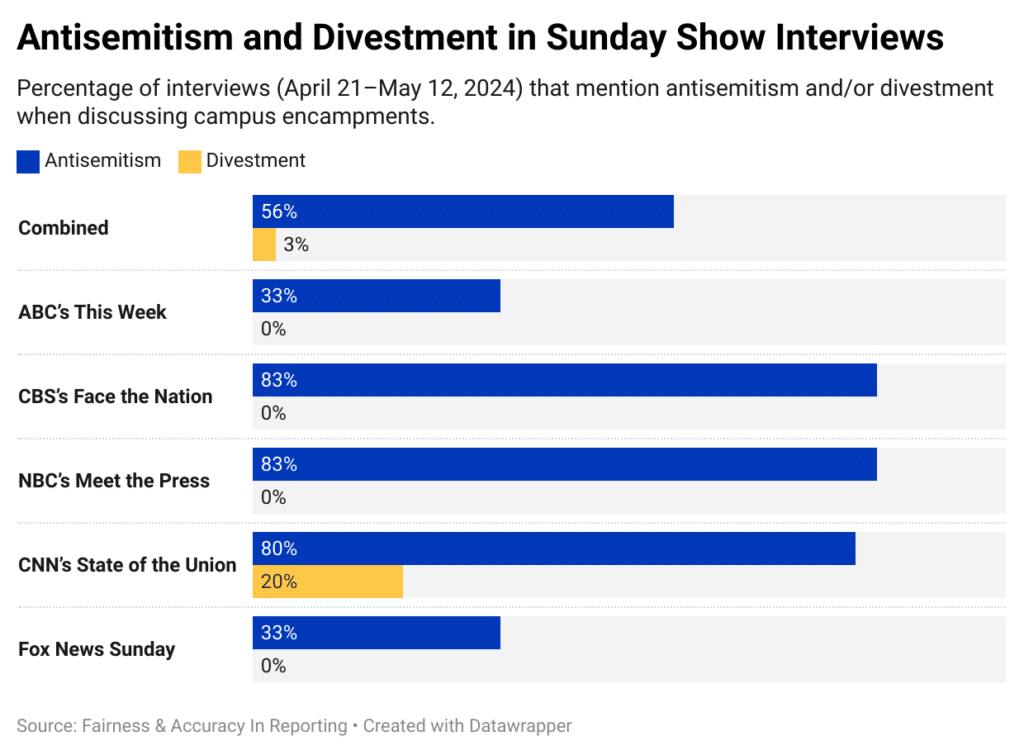
There were two questions asked about the safety of Jewish students (CNN, 4/28/24, 5/5/24)—by which CNN meant pro-Israel Jewish students, as many Jewish students took part in the encampments. (Forty-two percent of young Jewish Americans say Israel’s response to October 7 is “unacceptable,” according to Pew Research Center polling.) Only one question was asked about the safety of Muslim students (CNN, 5/5/24), even though both groups reported feeling almost equally unsafe.
All questions on violence related to the protesters, and not to counter-protesters or law enforcement. The interview with Bass (CNN, 4/28/24) made no mention of the violent counter-protests at UCLA that sent 25 protesters to the emergency room, but instead focused on hypothetical dangers to pro-Israel students.
Weekday News Shows: Rare Sightings of Protesters
In the same period as the study on Sunday shows, FAIR analyzed every episode of CNN’s Lead With Jake Tapper, MSNBC’s ReidOut, Fox News’ Hannity and PBS’s NewsHour. These daily programs were chosen as representative, highly rated daily news shows that have a focus on political discussion. Although the evening shows, unlike the Sunday shows, included occasional student voices, they were far outnumbered by government officials, journalists and educators—and only two student guests were protesters.
Of the 79 guests who appeared on these shows, 23 (29%) were current or former government officials and politicians, 19 (24%) were university-level educators and administrators, 18 (23%) were journalists, six (8%) were students and 13 (16%) had other jobs.
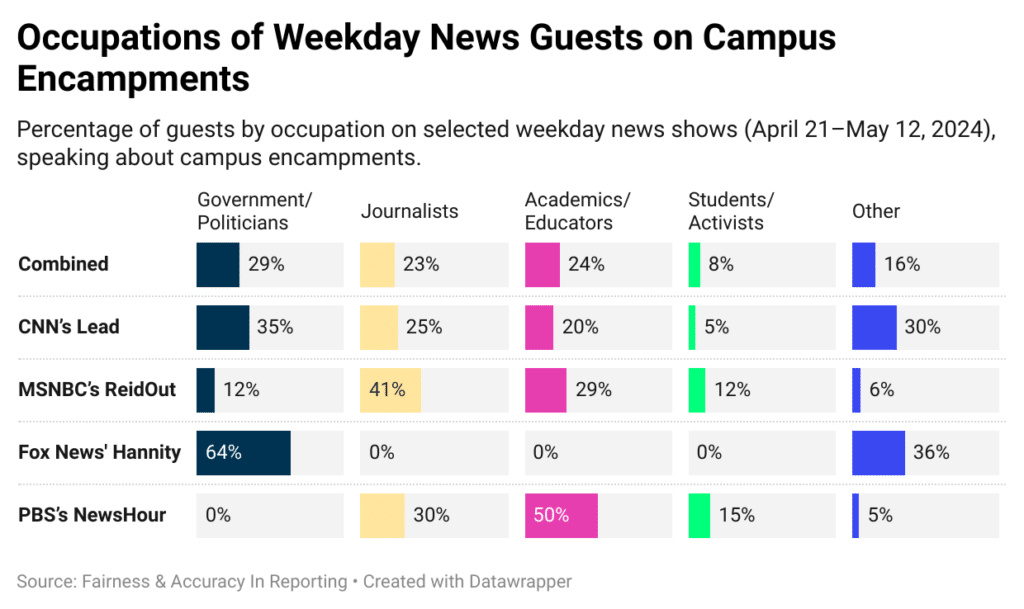
These shows showed more variation across the networks than the Sunday shows. Sixty-five percent of PBS NewsHour‘s guests were university-affiliated, for instance, and none were government officials, while almost two-thirds of Hannity‘s guests on Fox News (64%) were government officials and politicians, with no educators or students appearing.
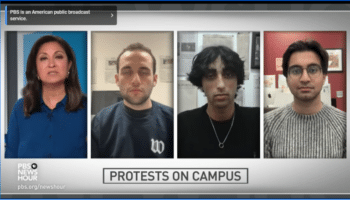
The three student journalists found on daily news shows all appeared together on one episode of the PBS NewsHour (4/30/24).
There were a total of six students invited among the 79 guests, accounting for fewer than 8% of all interviewees. Two of these were pro-Palestine protesters, both appearing on MSNBC‘s ReidOut (4/22/24, 4/30/34). Three were nonaligned student journalists, all appearing together on PBS (4/30/24), and one, a student government leader at Columbia, was an Israeli who supported her government (CNN, 4/30/24).
One of the students on ReidOut (4/30/24), identified only by his first name, Andrew, described the police brutality at Washington University in St. Louis:
I was held in custody for six hours. I wasn’t provided food or water, and I have since been suspended and banned from my campus.
Andrew was one of just two guests who mentioned police brutality. The other student protester, Marium Alwan, told host Joy Reid (4/22/24) that the Columbia encampment, and all encampments, “stand for liberation and human rights and equality for Jewish people, Palestinians.” When asked about antisemitism, she said they “stand against hateful rhetoric.”
Maya Platek, the only student featured on CNN‘s Lead (4/30/24), was president elect of the Columbia School of General Studies (and former head content writer for the IDF Spokesperson’s Unit). She said that at Columbia, she “would not say that I have been feeling the most comfortable.” She called the idea of divesting from Israel, and suspending Columbia’s dual-degree program with Tel Aviv University,
completely atrocious.
Completely shutting out student voices, Fox News prioritized right-wing politicians like former President Donald Trump, Florida Gov. Ron DeSantis and former presidential candidate Vivek Ramaswamy to speak on the protests. Texas Sen. Ted Cruz (Hannity, 4/30/24) compared the encampments to “Poland pre—World War II” and “Kristallnacht.”
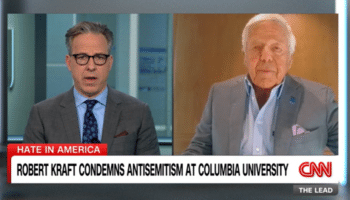
New England Patriots owner Robert Kraft (CNN, 4/22/24) was brought on to talk about student protests more often than all student protesters put together.
CNN‘s Lead, the show with the second-highest number of government official guests (35%), featured more centrists than did Hannity. Florida Rep. Jared Moskowitz (5/1/24) said that while “it’s their First Amendment right” to protest, for students to say such as “go back to Poland or bomb Tel Aviv or kill all the Zionists” was not acceptable, a message similar to those frequently heard on the Sunday shows.
Robert Kraft, owner of the New England Patriots and a major donor to Columbia University, was invited to speak about encampments three times (Fox, 4/22/24, 5/1/24; CNN, 4/22/24)—more times than student protesters spoke across all four shows.
Although a slight improvement over the Sunday shows’ complete shut-out of student voices, these daily news shows still had relatively few references to divestment, which came up in 16 interviews (20%), or police violence, mentioned in seven interviews. This compares to 33 interviews (42%) that discussed antisemitism.
Newspaper Op-Eds: Views From a Staffer’s Desk
The opinion columns of corporate newspapers did no better at including student protesters’ voices than the TV shows. FAIR analyzed every op-ed primarily about the campus encampments in the same time span (April 21—May 12), from the New York Times, USA Today, Wall StreetJournal and Washington Post.
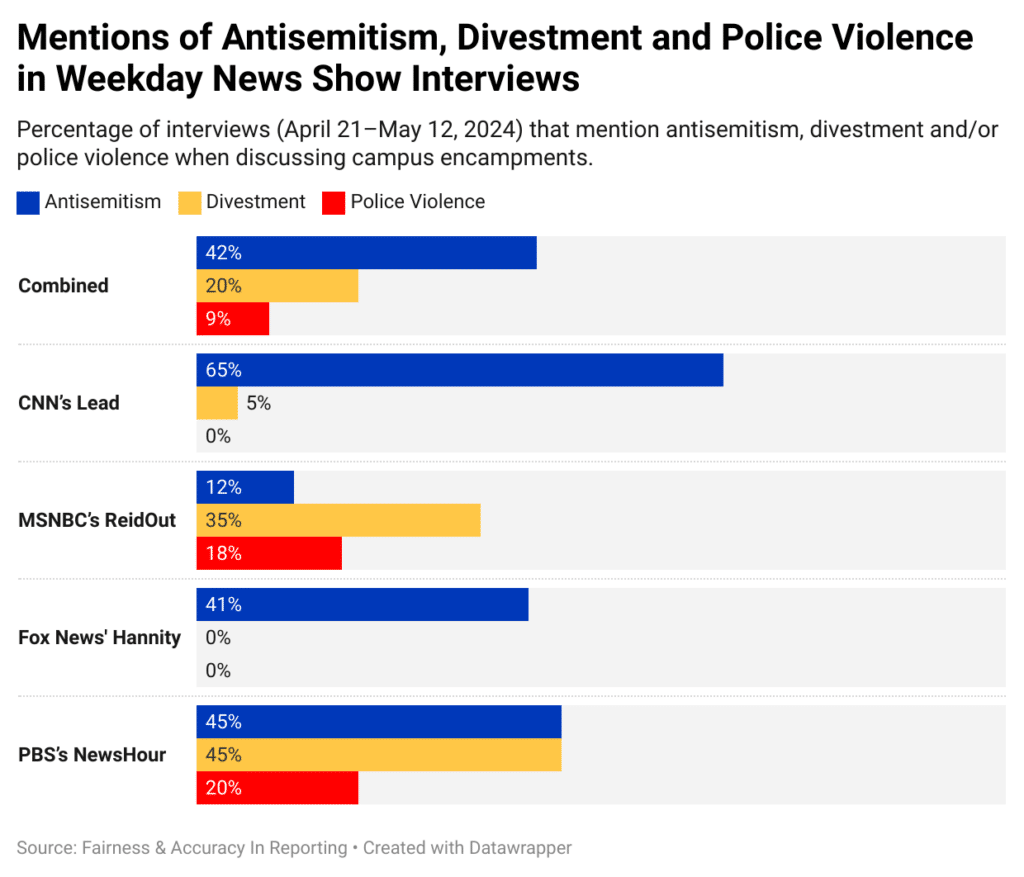
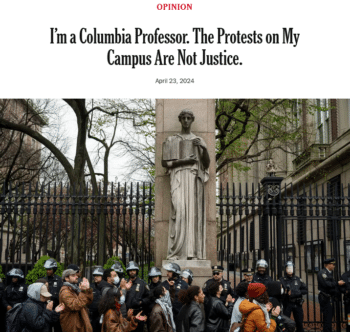
Free-speech celebrant John McWhorter wrote a column for the New York Times (4/23/24) that wondered why students were allowed to protest against Israel.
In the observed period, the Times published 11 op-eds about the campus encampments, all written by Times columnists. The paper failed to include any students or activists in its opinion section.
Out of nine different Times columnists, only one mentioned visiting an encampment: John McWhorter (4/23/24), a Columbia professor who writes regularly for the paper, was critical of the protests happening at his university. The self-styled free-speech advocate demanded to know,
Why do so many people think that weeks-long campus protests against not just the war in Gaza but Israel’s very existence are nevertheless permissible?
During the same period, the Washington Post also ran 11 encampment-related op-eds. Ten were written by regular columnists, and two mentioned having visited an encampment. Those two—Karen Attiah (5/2/24) and Eugene Robinson (4/29/24)—wrote positively of the protests. Attiah wrote of her visit:
Around me, students were reading, studying and chatting. Some were making art and painting. I saw an environment rich with learning, but I did not see disruption.
The paper’s only guest column on the encampments was penned by Paul Berman (4/26/24), a Columbia graduate and writer for the center-right Jewish magazine Tablet, who opined that the student protesters had “gone out of their minds,” and that professors were to blame for “intellectual degeneration.” Like the Times, the Post failed to include any students or activists in their opinion section.
‘We bruise, we feel’
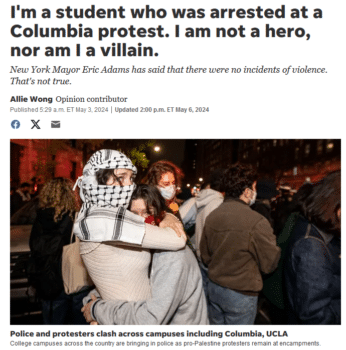
In the only op-ed the study found written by a student protester (USA Today, 5/8/24), Columbia’s Allie Wong was able to succinctly state the objective of the encampments: “We are calling to end the violence and genocide against our Palestinian brothers and sisters.”
USA Today published fewer encampment-related opinion pieces, but invited more outside perspectives. Of its seven columns during the study period, four were written by regular columnists, one by Columbia student protester Allie Wong (5/8/24), one by pro-Israel advocate Nathan J. Diament (4/22/24) and one by the son of Holocaust survivor Eli Wiesel (5/2/24).
In her op-ed, Wong described the police brutality exhibited during her and other protesters’ arrests:
We clung tighter to one another as they approached us, and seized us like rag dolls and slammed us into the hallowed ground of brick and concrete. But unlike rag dolls, we bleed, we crack, we bruise, we feel.
Wong’s piece was also the only one in USA Today to mention divestment, and one of only three pieces to mention divestment among all op-eds in the study. (The other two, from the Wall Street Journal, called the divestment demands “useless”—4/30/24—and “a breach of fiduciary obligation”—5/5/24.)
The Wall Street Journal had the most op-eds of the four papers. Its 22 pieces on the encampments included four by educators and one by a student. Unlike most other student and educator voices across our study, however, the student and educator guests on the Journal were highly critical of the protests.
Dawn Watkins Wiese (5/9/24) wrote a column titled “Fraternities Are a Cure for What Ails Higher Education,” asserting that the counter-protesters instigating violence at UNC “acted bravely.” Wiese is the chief operating officer of FRMT Ltd., an insurer of fraternities.
Ben Sasse (5/3/24), president of the University of Florida (and a former Republican senator), charged that the students were uneducated: “‘From the river to the sea.’ Which river? Which sea?” he wrote, suggesting that students didn’t know what they were protesting about.
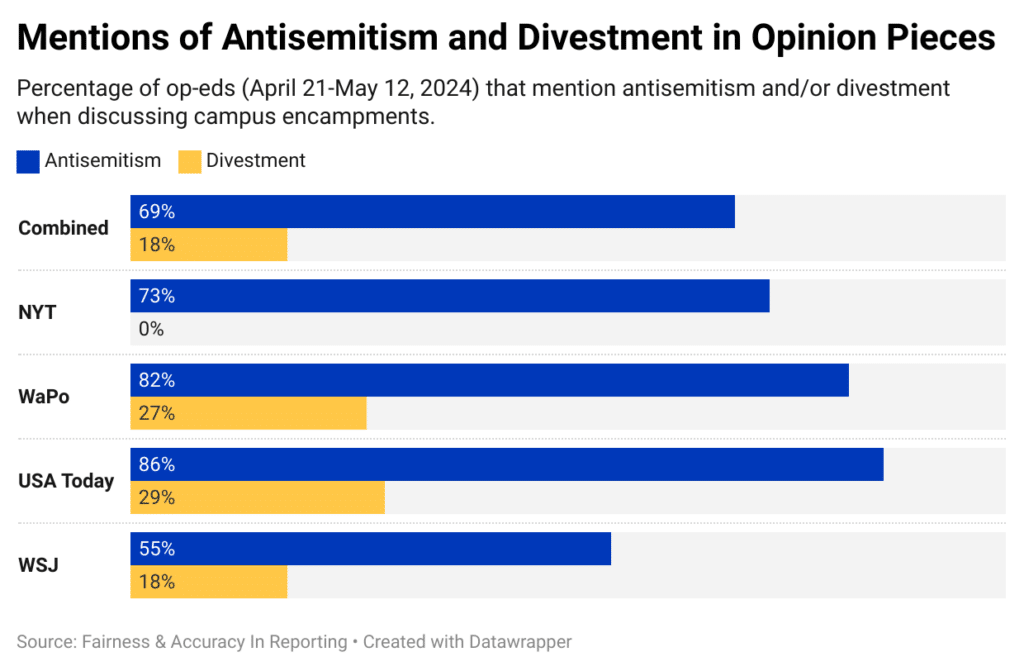
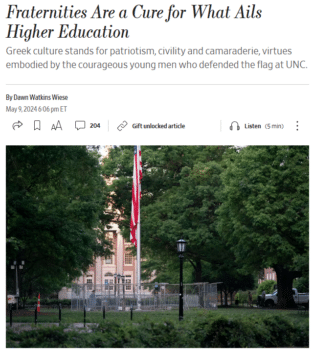
The Wall Street Journal (5/9/24 ran an editorial calling fraternities the antidote to encampments, written by someone who sells insurance to fraternities.
The one student on the Journal‘s op-ed pages, Yale’s Gabriel Diamond (4/21/24), called for the expulsion of his protesting classmates for being “violent.” According to Yale Daily News president Anika Seth (4/30/24), no violence had been documented at the school’s encampment.
Takeaways: Avoid Demands
Across corporate media, the lack of student and protester voices in discussions of student protests is striking. Virtually every university has student journalists, yet only four of them were found in the study, compared to the more than 50 non-student journalists and columnists, the vast majority of whom gave no sign of ever having been to an encampment.
Despite polling that found Jewish and Muslim students feeling almost equally unsafe, antisemitism was mentioned in 88 different interviews and editorials, while Islamophobia was mentioned in only six interviews and one op-ed (Washington Post, 5/2/24). Divestment was only mentioned 26 times, despite it being the principal goal of the encampments.
The Palestine campus protests were not the first time corporate media avoided the demands of protesters. A 2020 FAIR study (8/12/20) of coverage of Black Lives Matter protests showed a “heavy focus on whether the protests were violent or nonviolent, rather than on the demands of the protesters,” a description that applies equally well to the coverage and commentary examined in this study.
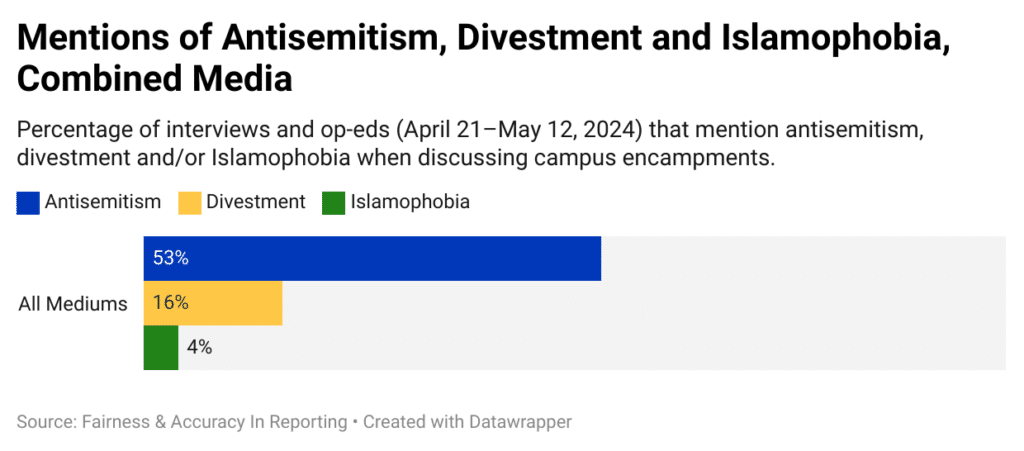
Research assistance: Owen Schacht
Felipe Rendall is a student in Jersey City with interests in politics, art and law.

